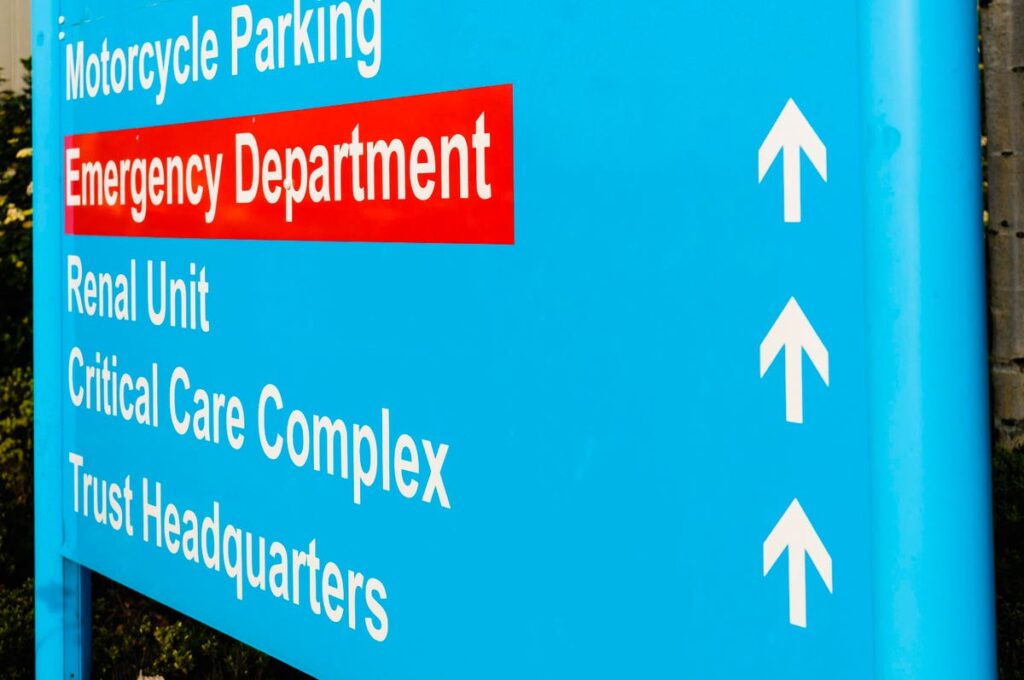Hospital sign for Emergency Department, Renal Unit, Critical Care and Trust HQ
Patients in England’s hospitals are waiting longer than ever for care. And not just a little longer.
Over the last financial year, more than 1.7 million patients waited in emergency rooms for more than 12 hours after arriving. That’s just under 8% of all ER attendances.
And more than 410,000 patients still weren’t in a non-emergency bed 12 hours after clinicians had made the call to admit them. How long these patients waited to be assessed beforehand — or how long they may have waited for an ambulance — is not recorded.
Both of these figures are enormous jumps on results from the year before, which were already far higher than those from the year before that.
In 2021/2022, just under a million patients spent more than 12 hours in the emergency room, and around 100,000 waited more than 12 hours to be admitted after doctors decided they should be.
Although emergency room waiting times have been rising for years, the scale of the waits the data published on Thursday by the country’s public health system reveals is unprecedented.
Back in 2018/19, around 3,300 patients waited more than 12 hours for admission following a decision from ER clinicians. In 2012/13, just 170 patients waited this long.
There are many elements to this crisis in emergency care, including longstanding staff shortages, a limited number of hospital beds and rising demand for services.
One major factor is a lack of social care capacity across the country. Clinicians don’t always have a safe place to discharge frail or vulnerable patients, meaning they often end up staying longer in acute hospitals settings than medically necessary.
With demand vastly outstripping capacity, it can take a long time for community-based care to become available.
This limits the availability of hospital beds for new emergency patients, leaving many waiting in ambulances, emergency departments and even corridors for ward space to open up.
Crowded emergency departments, in turn, slow down ambulance handover times, meaning more vehicles are queuing up outside hospitals and less teams are available to respond to new calls.
All of this waiting impacts a patient’s care and — in some particularly tragic cases — contributes to deaths.
I found cases of patients who had died after waiting more than a day from their first call to emergency services to their admission to a hospital bed during a recent review of warnings from England’s coroners for the Health Service Journal.
With emergency departments and ambulance teams across the country overwhelmed, its likely that lengthy waits have contributed to thousands of deaths.
Long emergency room waits may be linked to some 23,000 excess deaths in 2022, according to research from the Royal College of Emergency Medicine.
College president Dr Adrian Boyle warned that this year would be yet another “difficult” winter for the National Health Service, following a “dire” 2022.
“We know that it is the elderly, the sickest and most vulnerable, and those experiencing a mental health crisis that face the longest waits for a bed,” he said in a statement. “We have not seen sufficient progress on reducing long stays for patients who need to be admitted to hospital.”
“We are pleased that the government has committed to regularly publishing 12-hour length of stay data measured from the time arrival, as this is shining a light on this problem.
Miriam Deakin, director of policy and strategy at industry body NHS Providers, said in a statement that trusts were “working incredibly hard” to see “more patients than ever before.”
“Shortages of staff, beds and equipment, as well as the need for proper investment in the NHS estate, social care, and more preventative support, are putting the health service under an alarming level of stress,” she said.
Months of industrial action from NHS staff, she added, were “also piling on the pressure.”
“By the end of this week, more than a million patients will have had their appointments and procedures pushed back due to industrial action,” she said.
For the last ten months, different groups of staff have been holding strikes over pay and working conditions, with both junior and senior doctors walking out this week.
Urging ministers and labor unions to negogiate, Deakin said an end to the strikes was “the most pressing need” facing the health service.


